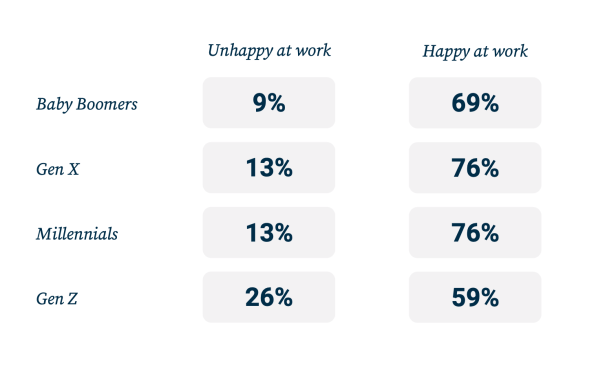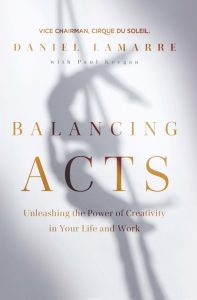By Sarah Bregel
First, there was a push for a shorter workweek. Then, “quiet quitting” made the rounds. Now, the concept of “bare minimum Mondays” has taken over social media.
The latest trends in the workforce emphasize how important self-care and work-life balance are to younger generations. But in order for managers to effectively run their entire teams, they need a better understanding of what drives workplace happiness for everyone, from baby boomers to Gen Z.
That was the aim of a new study from Cangrade, an AI-based hiring solution, which revealed how happy each generation is at work and why.
For the study, 608 people from four generations—boomers, Gen X, millennials, and Gen Z—were asked a series of questions in an online survey. The goal was to help gauge their attitudes and values at work in the United States. It found that, while there are similar rates of happiness across the older three generations, Gen Z is by far the least happy at work.
Twenty-six percent of Gen Zers were unhappy in their jobs, and 17% were actively thinking about quitting. That perhaps has to do with the fact that the youngest generation in the workforce have only just entered it and are therefore more likely to hold entry-level positions. Mental health aspects may also be at play. According to the Mental Health Million Project, Gen Z has the lowest rates of overall mental wellness.

Still, values are crucial to how happy each generation is at work, and those values differ, the study shows. For instance, feeling proud of the work they do is crucial to workplace happiness for Gen X and millennials, while baby boomers were more likely than other generations to say their work is deeply important to their overall identity. They also value feeling heard at work.
For Gen Z, meanwhile, happiness at work is tied to how passionate they are about the work they do. “My work environment brings out the best in me” was the statement that correlated with the youngest generation’s work happiness the most. Here are a few key highlights from the survey:
While values, of course, are bound to shift from one generation to the next, just how vastly different those values are makes it tough for employers to keep everyone content. That seems especially true when it comes to Gen Z.
According to the study, the newest generation wants more from their jobs. They want professional development and won’t be content without new opportunities to learn, mentorship, and growth. And if they need their work to bring out the best in them, it has to really mean something, too.

(23)
Report Post







